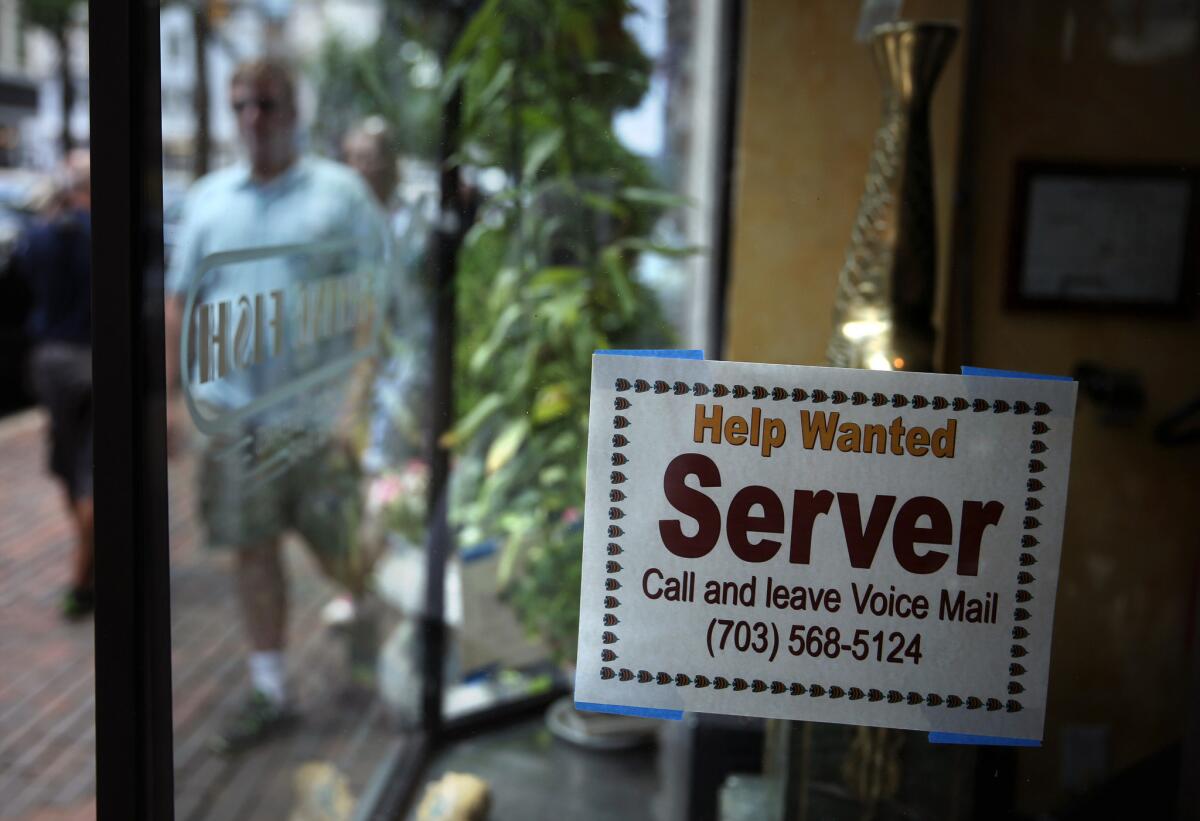Latest jobs report makes the case for tax reform

- Share via
Back in mid-2009, when policymakers finally seemed to grasp how severe the recession was, economists at the Congressional Budget Office warned that it would take the country about six years to return to full employment. Almost four years have passed since the jobless rate peaked at 10%, and we’re less than halfway back to the unemployment rates seen before the Wall Street meltdown. And that’s despite the fact that the workforce has shrunk, thanks in part to retirements and more people going to school full time instead of looking for jobs.
That’s the framework for considering Friday’s report from the Bureau of Labor Statistics that nonfarm employers added 195,000 jobs in June, about the same number as in April and May. As in May, the number of people working or looking for work increased slightly, which is an encouraging sign about the public’s confidence in the economy. Yet the number of would-be full-time workers stuck in part-time jobs increased, as did the number of unemployed Americans who have given up looking for work. The percentage of people unemployed, as well as the percentage who have been unemployed for more than half a year, remained unchanged.
In sum, the economy continues to tread water. That’s not bad, considering the recession in Europe and the belt-tightening in Washington and some state capitals that has gradually but steadily reduced the number of jobs in the public sector. But it’s no cause for celebration either; at the current rate of job creation, which barely keeps pace with population growth, the full-employment goal line just keeps moving farther and farther into the distance.
Sadly, Washington seems likely to be locked in yet another partisan battle for much of the rest of the year over how much to cut spending in the near future. That’s not to say the deficit isn’t important. It is, and the sooner Congress settles on a plan for reining in the future growth of entitlements and closing the stubborn gap between revenue and spending, the better.
What needs to happen now, though, is faster economic growth. And by conventional measures, such as the cost of capital, the budget deficit doesn’t appear to be the force holding the economy back. Rather, businesses aren’t starting or expanding because they’re not seeing enough demand to justify the investment.
Republicans argue that overweening federal regulations, especially those related to the 2010 Patient Protection and Affordable Care Act (a.k.a. Obamacare), are a big part of that problem. They also argue that businesses are being deterred by the prospect of higher taxes in the future to pay for the debt being run up today. Democrats counter that the austerity demanded by the GOP is only making matters worse by eliminating public-sector jobs.
I don’t see how the two sides ever come to agreement on economic theory. But if they could agree to make growth the top priority -- the deficit can’t possibly be overcome without it -- then there is a middle ground. That would be overhauling the tax code, eliminating the complexity that raises costs and encourages avoidance while preserving progressivity. The nonpartisan groups that have looked at the issue agree that lawmakers could raise the same amount or even more while lowering marginal rates, which would be a shot in the arm for the economy.
Such an overhaul is far easier said than done. Entrenched interest groups defend every wrinkle in the tax code, and there are good public policy arguments for some of them (e.g., the exemption for employer health benefits, which is one of the most expensive forms of tax subsidy). The two parties also have a fundamental disagreement over whether a reform should be revenue-neutral (the GOP position) or raise money to narrow the deficit (the Democrats’ stance). And some Republicans even argue against imposing higher marginal tax rates on upper incomes, although most Americans seem quite happy with the idea -- witness the broad support for ending the tax cuts President George W. Bush pushed through for the top brackets.
Nevertheless, there’s reason to hope that Congress and President Obama, who has endorsed the idea of a comprehensive tax reform, can get the job done. The public strongly favors a simpler tax system, and leaders of the House and Senate tax-writing committees have been holding hearings for two years on how to rewrite the code. The chairman and top Republican on the Senate Finance Committee recently announced a “blank slate” approach to overhauling tax law, declaring that their proposal will remove each credit, deduction, exemption and other tax expenditure unless their colleagues make a persuasive case to retain it.
That’s the right starting point.
ALSO:
Obamacare’s troubling, stumbling start
Come home, Ed Snowden, and face the music
Follow Jon Healey on Twitter @jcahealey
More to Read
A cure for the common opinion
Get thought-provoking perspectives with our weekly newsletter.
You may occasionally receive promotional content from the Los Angeles Times.







